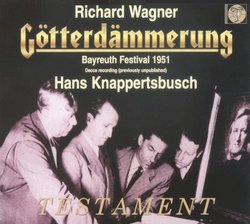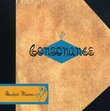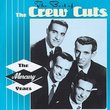| All Artists: Bernd Aldenhoff, Herrmann Uhde, Ludwig Weber, Bayreuth Festival Orchestra, Hans Knappertsbusch Title: Gotterdammerung / Knappertsbusch, Varnay, Aldenhoff, Uhde, et al Members Wishing: 0 Total Copies: 0 Label: Testament UK Release Date: 9/7/1999 Album Type: Box set, Import Genre: Classical Styles: Opera & Classical Vocal, Historical Periods, Modern, 20th, & 21st Century, Symphonies Number of Discs: 4 SwapaCD Credits: 4 UPC: 749677417529 |
Search - Bernd Aldenhoff, Herrmann Uhde, Ludwig Weber :: Gotterdammerung / Knappertsbusch, Varnay, Aldenhoff, Uhde, et al
 | Bernd Aldenhoff, Herrmann Uhde, Ludwig Weber Gotterdammerung / Knappertsbusch, Varnay, Aldenhoff, Uhde, et al Genre: Classical
It's still easy to imagine the anticipation that must have attended the Bayreuth Festival in 1951 when it reopened for the first time since the war. This was the epoch-making summer when Wieland Wagner began to unveil a bo... more » |
Larger Image |
CD DetailsSynopsis
Amazon.com It's still easy to imagine the anticipation that must have attended the Bayreuth Festival in 1951 when it reopened for the first time since the war. This was the epoch-making summer when Wieland Wagner began to unveil a bold rethinking of his grandfather's canon--and to distance his art from the ideological trappings of the Third Reich--through increasingly austere and abstract productions. One member of the recording teams on hand (rivals EMI and Decca) was John Culshaw, who would later become famous as the mastermind producer behind the first and still most-popular studio recording of the Ring. Despite problems with the rest of the cycle, Culshaw managed to register its epic concluding work to his satisfaction. Yet that legendary Götterdämmerung sat in the archives for almost half a century due to contractual complications. This release at last makes its glories available. Conductor Hans Knappertsbusch--a master of the grand old tradition who is above all prized for his incomparable accounts of Parsifal--presides over a majestically scaled performance right from the doom-colored opening chord. Its cumulative power builds like a juggernaut. Though Knappertsbusch's famously weighty pacing makes this probably the slowest Götterdämmerung on record, the tempi rarely feel distended but rather enable Wagner's densely webbed, late-style ripeness to reverberate with its full emotional resonance. Knappertsbusch also knows how to keep a particular dramatic moment taut without losing his command of the larger context, as in the confrontation between Brünnhilde and Waltraute or Act II's vengeance trio. And in the funeral march you won't hear Soltian muscle but a profoundly resigned summation far subtler in its impact. The relatively young cast features some of Bayreuth's finest postwar artists, several making their festival debut during the 1951 reopening. Astrid Varnay proves her claim as Flagstad's successor, imbuing Brünnhilde's transfiguring love and subsequent betrayal with a presence that is completely gripping from the beginning to the cycle's cataclysmic end. Variety of color endows Bernd Aldenhoff's Siegfried with more dimensions than most interpreters; he can be sweet-voiced or imperious, rising to glory in the Act I duet and summoning a blustery bravado in his scene with the Rhinemaidens. Marth Mödl's angsty, dark-hued tone gives Gutrune an intensity far beyond the usual passive dimwit, while Hermann Uhde portrays her brother--despite his straining upper range--as a complex tangle of ambition and self-doubt. An integral part of this tremendously tight-knit ensemble is Ludwig Weber's intimidating Hagen. He gives the villain a truly Iago-like scope, brooding in the malignancy of his monologues and striking a chord of sheer terror in the scene of Siegfried's murder. In short, this set belongs in the collection of anyone interested in the performance of Wagner--or of great musical drama, period. --Thomas May Similar CDs
|
CD ReviewsKnappertsbusch at his best Erik Aleksander Moe | Oslo, Norway | 01/28/2004 (5 out of 5 stars) "Since I bought this performance I have bought many other live recordings of this opera from around this era. The 1955 Kna performance from Munich, the '52 performance with Keilberth and Lorenz are among the better ones. But I always fall back to this one recorded in 1951 at the first Bayreuth festival after the second world war. The freshness of the performance, the magnificent conducting by Knappertsbusch are the main reasons. This is a performance that gets better with each hearing. A statement I cannot make about any stereo set. I have come to think that Windgassen is not an ideal Siegfried. He is OK as the younger Siegfried, but in Gotterdammerung he seems more miscast every time I hear it, whether it is the 1953(Krauss and Keilberth), '56(Kna), '67(Bohm) or Solti's performance. He doesn't have the necessary weight that I feel it requires. Bernd Aldenhoff, who sings Siegfried here is something totally different. He may seem to be unsteady when first heard, but he gets better and better every time I hear him. His understanding of the role and the glorious sounds he makes us believe that he is a fearless hero who can do anything. When he is stabbed in the third act he is so touching that we feel with him as he dies from the fatal blow.Then there is the magnificently exciting Astrid Varnay as Brunnhilde. She is the supreme Brunnhilde from the post war era. In all aspects of the role she outshines all competiton. The passion in the duet in the prologue, the determination and fear in the first act. Suprised and enraged in the second act and dedication and determination in the third. All these emotions are sung so tremendously grand. Her Brunnhilde here is also quite fresh and youthful which makes it better than her performance in 1956.Ludwig Weber also stars in this performance. He is, after Ivar Andresen, my favourite Hagen. All the menace and smoothness he gives makes his Hagen to cherish above all others. Josef Greindl was a favourite by Wieland Wagner in the years after. Personally I think that Weber is superior in all aspects of the role. His 'Hagen's Watch' and calling of the vassals are done with so much grandour and menace. Greindl was good at producing menace but not much else in this role. Weber's Hagen is sometimes even likable. It rivals Gurnemanz as his greatest role.Herrmann Uhde is his usual great self as Gunther and gives the character a multidimensional quality. Martha Mödl also gives so much to the role of Gutrune, normally given to lesser singers. She is a worthy suitor to Siegfried and it is understandable that he falls for her after she has cast her spell to erase his memory of Brunnhilde.Knappertsbusch conducts this performance quite slowly, but with so much magic and excitement. He gives so much from start to finish. He delivers the best Norn scene I have ever heard. The first scene in act 2 is also quite creepy with Hagen talking to Alberich. He doesn't rush anything and he keeps the performance in check at all times and gives it a freshness that is missing from so many.The sound is in good mono. It is, after all, live and it is much better than many other live performances from this era. Included with this set is a libretto with an English translation and an essay on the performance and Bayreuth. I very highly recommend this performance." A Beautiful and Important Document dbm1257 | Austin, Texas | 01/27/2000 (4 out of 5 stars) "I actually wanted to rate this 4.5 stars. This recording is worth the money for anyone who wants to hear a first-class, "live" performance of the last of Wagner's "Ring" operas. It is of special value to listeners who know and love Wagner's "Ring" cycle and the recordings of Wieland Wagner's first production of the cycle that was performed at Bayreuth during the '50's. There are a number of issues of radio broadcasts, and thanks to them we can know and study the performances of Astrid Varnay (my favorite Brünnhilde), Hans Knappertsbusch, and quite a few others. The problem is that the sound quality of these tapes ranges from okay to awful.What sets this recording apart from the radio tapes is that it was a commercial recording, recorded by Decca at the 1951 festival. The world at large has known about this recording since the publication of John Culshaw's book, "Ring Resounding," in the late '60's. Now that I have heard it for myself, I must say that it is one of the most exciting and satisfying performances that I know of this glorious opera.For those who know the recording of "Parsifal" recorded by Decca at the same festival (and last issued on CD by Teldec), I find the sound of the orchestra in "Götterdämmerung" to be quite a bit more beautiful than in "Parsifal." This recording seems to capture more of the resonance and warmth of the sound of the Bayreuth Festspielhaus, and it is quite exciting. For me, the primary value of this recording is the way it documents the Bayreuth orchestra and what Hans Knappertsbusch could achieve with it on a good night.Many of the cast members' interpretations are known to us from the radio tapes, and it is wonderful to have them in high(er) fidelity. The only member of the principals that I found truly disappointing was Bernd Aldenhoff as Siegfried. His sound is strident, with a wide vibrato that at times seriously obscures the pitch. However, he is significantly less inaccurate and irritating than he was in "Siegfried" from the 1957 festival.I wish to note especially Ludwig Weber as Hagen and Elisabeth Höngen as Waltraute, two top-class performances that I know otherwise only from Furtwängler's cycle from La Scala, 1950, a recording which does not flatter the singers. The excellence of these two singers' performances is fully revealed in this recording and deserves to be enjoyed and studied.As often happens with a piece this complicated, things go wrong in this live performance. However, I found those problems to be minor, and the virtues of this performance definitely outweight its faults. For someone who has never heard the piece, this recording is a good choice for a "first exposure."" This set is expensive. dijeet2shankar | CA, USA | 01/10/2004 (5 out of 5 stars) "So I read all the reviews. Gramophone magazine gives it the highest marks - 3 "stars". Every review I read raved about it. So I plunged in. Result?It really is that great. It was worth my every penny. One of the most expensive sets I've ever bought. Yet one of the most valuable sets in my collection. Astrid Varnay is beyond belief as Brunnhilde. And good old Knappertsbusch always brings out the music like no one else.What a memorable find!! Thank you Testament for the superb remastering!! Thank you Culshaw for preserving this performance for posterity."
|

 Track Listings (14) - Disc #1
Track Listings (14) - Disc #1
